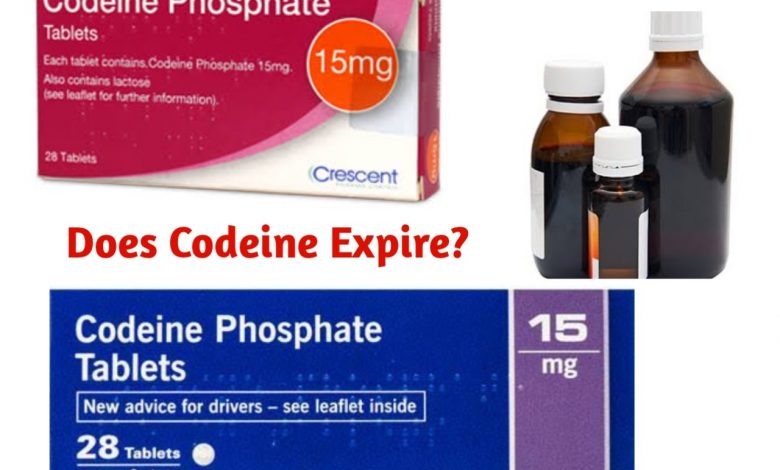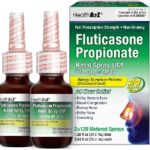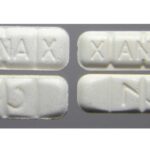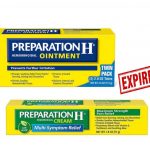Does Codeine Expire?

What is codeine?
Codeine is an opioid pain medication that is used to treat mild to moderately severe pain and also help reduce coughing. Codeine is available as a single-ingredient tablet and also available in multi ingredients products combined with other pain relieving medicines or cold and flu medicines.
Codeine helps to relieve symptoms but does not treat the cause of symptoms or speed recovery. Codeine belongs to a class of medications called opiate (narcotic) analgesics and to a class of medications called antitussives. When codeine is used to treat pain, it works by changing the way the brain and nervous system respond to pain. When codeine is used to reduce coughing, it works by decreasing the activity in the part of the brain that causes coughing.
Codeine is also available in combination with acetaminophen (Capital and Codeine, Tylenol with Codeine), aspirin, carisoprodol, and promethazine and as an ingredient in many cough and cold medications. This monograph only includes information about the use of codeine. If you are taking a codeine combination product, be sure to read information about all the ingredients in the product you are taking and ask your doctor or pharmacist for more information.
Does Codeine Expire?
Yes, Codeine Phosphate and other codeine-containing medications like Panadeine, Nurofen Plus, Mersyndol as well as Promethazine/codeine cough syrups can expire. An expiration date is a date after which a consumable product such as food or medicine should not be used because it may be spoiled, damaged, or ineffective. Expiration dates are especially important for medications because they offer the only indication about whether the product is still safe to use
In the late 1970s, the United States Food and Drug Administration (FDA) mandated that all prescription and over-the-counter (OTC) medical products contain an expiration date. Expiration dates for medicines are often marked “EXP” and are printed on the label or stamped onto the medicine bottle or box.
Can expired Codeine hurt you?
Yes, expired Codeine can hurt you because it is less effective and risky due to a change in chemical composition or a decrease in strength. The expiration date is the final day that the manufacturer guarantees the full potency and safety of a medication. Drug expiration dates exist on most medication labels, including prescription, over-the-counter (OTC) and dietary (herbal) supplements. U.S. pharmaceutical manufacturers are required by law to place expiration dates on prescription products prior to marketing.
Certain expired medications are at risk of bacterial growth and a sub-potent Codeine can fail to treat pain or reduce coughing, leading to more serious illnesses. Once the expiration date has passed (usually two to three years after the date of manufacture) there is no guarantee that the medicine will be safe and effective. If your Codeine has expired, do not use it. Even though some controversial studies indicate that some drugs can be used after expiry dates, it is better to err on the side of caution in order not to complicate your health condition or trigger unwanted adverse effects.
Note: An expired Codeine can still interact with other medications which include: Erythromycin (Erytab, Erythrocin); certain antifungal medications including ketoconazole; benzodiazepines such as alprazolam (Xanax), diazepam (Diastat, Valium), estazolam, flurazepam, lorazepam (Ativan), and triazolam (Halcion); carbamazepine (Carbatrol, Epitol, Equetro, Tegretol, Teril); certain medications for human immunodeficiency virus (HIV) including indinavir (Crixivan), nelfinavir (Viracept), and ritonavir (Norvir, in Kaletra); medications for mental illness or nausea; other medications for pain; muscle relaxants; phenytoin (Dilantin, Phenytek); rifampin (Rifadin, Rimactane, in Rifamate); sedatives; sleeping pills; or tranquilizers.
Drinking alcohol or using street drugs during your treatment with codeine also increases the risk that you will experience these serious, life-threatening side effects. Do not drink alcohol, take prescription or nonprescription medications that contain alcohol, or use street drugs during your treatment.
What to do with expired Codeine?
The CDC reports that 50,000 young children end up in emergency rooms each year because they got into medicines while an adult wasn’t looking. Expired medicines are also not just a risk to the person they were prescribed for and can injure children and pets if taken by mistake. For all these reasons, proper disposal of unneeded medicines is essential.
Keep this medication in the container it came in, tightly closed, and out of reach of children. Store it at room temperature and away from excess light, heat, and moisture (not in the bathroom).
It is important to keep all medication out of sight and reach of children as many containers (such as weekly pill minders and those for eye drops, creams, patches, and inhalers) are not child-resistant and young children can open them easily. To protect young children from poisoning, always lock safety caps and immediately place the medication in a safe location – one that is up and away and out of their sight and reach. http://www.upandaway.org
Unneeded medications should be disposed of in special ways to ensure that pets, children, and other people cannot consume them. However, you should not flush this medication down the toilet. Instead, the best way to dispose of your medication is through a medicine take-back program. Talk to your pharmacist or contact your local garbage/recycling department to learn about take-back programs in your community. See the FDA’s Safe Disposal of Medicines website (http://goo.gl/c4Rm4p) for more information if you do not have access to a take-back program.
A place for everything
Proper storage is one way to help make sure your medicines will remain safe and effective up to their expiration date. Be sure to read the label to see if there are specific storage instructions for your medicine. Certain medicines need to be stored in the refrigerator and others cannot be exposed to high temperatures. Improper storage – such as a damp bathroom cabinet – can contribute to decreased effectiveness in medicines that have not reached their posted expiration date. For most medicines, to help ensure the proper shelf life of your medicine, it is better to store medicine in a cool, dry place such as a dresser drawer, storage box, closet shelf, or kitchen cabinet.
When storing medicine in a kitchen cabinet, make sure that it is away from hot appliances and the sink due to changing temperatures and humidity which can affect the medicine. When storing medicine in a high-traffic area like a kitchen, care should be taken to prevent access by children at risk of accidental poisoning or others who may be tempted to take for abuse/misuse.
Remember to store medicines properly and don’t use expired medicines, it’s not worth the risk!





